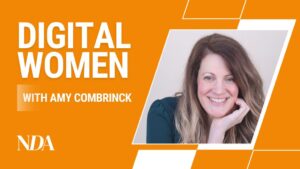NDA’s Digital Women series is talking to leaders from across our industry to understand the particular challenges, and opportunities faced by women. Next up isJoanne Reid, Delivery Director at Graphite Digital. Joanne has a decade of experience in project management and the digital agency space.
What is the biggest opportunity for women in your sector of the digital industry today?
Our industry has evolved dramatically over the years and since COVID-19, it has accelerated opportunities to enable a more flexible lifestyle that has really benefited and supported women in leadership roles.
As a working mother (with a young toddler), I am able to balance motherhood with my role as the Delivery Director at Graphite Digital. Gone are the days of commuting and physically being in the office to show I’m working. We now have the opportunity to manage work around our life, which was not easily done before COVID. Our new normal is here to stay.
Equally we are seeing more and more women in leadership roles in our sector. The flexibility that remote working offers allows us to juggle life at home with work, making it less of a compromise. As it has been challenging for most to get to where they are today in their leadership role, we are openly supporting, inspiring and championing other women to step up and overcome their limiting beliefs. We can truly have it all.
What is the biggest challenge to you as a woman in the digital industry and how are you overcoming it?
The biggest challenge for me is to always stay true to my beliefs, values and who I am as a person.
In the earlier stages of my career, I always felt I wasn’t good enough or I needed to be more like my male counterparts — mimicking how they spoke, acted or approached difficult situations. However, through my decade of experience in the industry, I have realised that my talent, drive, perseverance, hard work, and perspective is enough… I am more than good enough.
This is a challenge I overcome everyday when exposed to different work cultures, difficult business issues, clashing personalities or opposing work ethics or standards. All of these are out of my control, but I focus on building my resilience, mindset and doing what is right.
By striving to lead by example and remaining true to who I am, I won’t be conflicted within myself. If I see or hear something that goes against my beliefs or values, I won’t hesitate to speak up or avoid confrontation. If I don’t, then who will?
What three things could employer companies do to make the digital industry better for women?
The most important thing employers can do is to embrace diversity and inclusion within the workforce across all levels of the organisation (i.e. C-suite, Directors, Managers etc.). I have previously seen a low proportion of women being invited to C-suite roles due to gender, age or lifestyle biases (conscious and unconsciously). We need to change this and include those with diverse experiences, approaches, and styles to challenge the norm and accelerate the business.
Three things that helped me throughout my journey are:
- Fair appraisals based on role and performance. This should be a given for all companies however, being upfront about the matrix of success including the measurable goals (i.e. SMART goals) and expectations around performance allows for fair pay reviews and promotions. Women are less inclined to step forward and speak out about how great they are or why they deserve a promotion. oing regular check-ins against their role and performance (not just the one appraisal) encourages them to speak out about the things they have done and achieved. Following this approach also takes away any bias around age or gender providing equal opportunities across the organisation.
- Understanding women’s limiting beliefs and adapting your management style. It’s good to have open and honest conversations about starting a family, being on maternity leave, returning to work, childcare, menopause, ‘mummy guilt’, and balancing home with work. I share my story with many of the females within the organisation – it’s something we think about and I wish I had a leader who spoke about this openly to me earlier in my career. All I had as a reference point were male leaders who were mostly divorced or single.
On top of this, male senior leaders may not be aware that women have often inherited limiting beliefs from our mothers that unconsciously block us from progressing our careers. It was ingrained in me throughout my childhood that when I had children my career would be over. Equally, I was told I wouldn’t get into university so I shouldn’t bother. Each individual’s journey is different, however knowing that there are unconscious limitations allows organisations to support individuals in unlocking their hidden potential. By believing in them, they will start believing in themselves.
3. Flexible working hours and extra Dependent days: To avoid ‘mummy guilt’ as a full time working mum, I drop off my son each day without exception. This is a non negotiable for me each day and I do not take meetings before 9.15am to make sureI can do this. I was also offered additional Dependent days each year on top of annual leave, which really helped for those ‘unplanned’ sick days throughout the year.
What support structures and organisations are most important and effective to you as a woman in the digital industry?
Organisations can support women within the organisation with the following structures or incentives in place.
- Encouraging individuals to have mentors outside of the organisation. I have always had great support from other successful women within the Digital space that are not part of the organisation I work with. FemMentored, BIMA, and Agencynomics, to name a few, are organisations that support all levels within the organisation from juniors up to CEOs. Being part of these support networks encourages personal and professional growth that should be shared amongst all.
- Encouraging individuals to have mentors within the organisation. I always encourage my team to find a person within the organisation that inspires them. It can be a short six month program but it allows individuals to have support from anyone in the business. This can be within the same department or another team.
- Regular one-to-one meetings with Leadership. Open and honest communication should be promoted within the organisation and leaders should be the first ambassadors. I make one-to-one meetings open to my team each week in which they can talk openly about how they feel and how I can help. Whether I line manage them or not, I want to know more about them and their experience. Where I can help, I will absolutely do it.
What is the biggest misconception about women and by women in the digital industry?
Women are too emotional as leaders. Women see other women as competition.
Emotions are great – that’s our super power! We have a heightened awareness of unspoken conflicts impact upon individuals (personally or professionally). Emotions show we truly care, and being vulnerable in front of our employees allows us to be relatable and ‘human’.
In a recent survey from Deloitte, one in four leadership positions in large global technology firms will be held by women in 2022. This is certainly an exciting time for all women in digital who are reaching for their dream role, but a misconception by women in the digital industry is that there is only room for one female in senior leadership or on the board when there isn’t.







